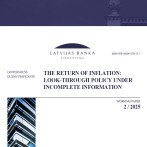The impact of global factors on inflation still persists
According to the data of the Central Statistical Bureau (CSB), the consumer price level in January was by 0.3% lower than a year ago. On the one hand, such a level of annual inflation could be evaluated as unexpectedly low, taking into account, for instance the increase in excise tax on fuel and a gradual increase in income, but it has to be taken into account that the drop in the prices of global resources persisted. The January inflation was affected also by an untypical drop in tourism services.
Both in December and the first half of January, oil prices in the global market continued to drop, but the possible effect of Iranian supply in the January price dynamic is less than clear. Even though the drop in oil prices took time to be reflected in the prices of fuel, i.e. it was more pronounced at the end of the month, overall, the tendency in oil prices has overwhelmed the influence of the raised excise tax, and the average fuel price level in January was by 3.3% lower than in December.
Already in December 2015, it was clear that the decrease in global energy resource prices accumulated in six months, will act to lower the price of natural gas also for Latvian households in the period from January to June. The current (i.e. December/January) global price trend had yet to find reflection in the tariffs of industrial consumers, including heating energy producers, but the average price of heating energy at the beginning of the year remained substantially lower than in January of last year ( -11.7%), including the drops in resource prices accumulated over the year. The latest information from Latvijas Gāze on tariffs for the industrial consumers indicates that the lowering of tariffs for heating energy will still be present in the bills for heating energy consumed in February and March.
This January, the prices for complex recreation services (tourism) dropped rapidly (by 6.1%), even though they often are characterized even by small rises. That reduced the monthly and annual inflation rather substantially.
As could have been expected, last year, the consumers' expenditure on various kinds of energy dropped / shrank and thus the proportion of these groups of goods in the consumption basket has contracted. Thus their price fluctuations will have a slightly lesser effect on this year's inflation than would be the case if the proportion of expenditure had not changed. Meanwhile, the impact of the liberalization of the electric energy market on the expenditure of the consumers has apparently been reduced by the rise in income and redistribution of expenditure in favour of the consumption of other goods and services.
Because of the contraction of the proportion of expenditure, the role of food prices in inflation has diminished slightly. And this trend characterises rising income in the developed countries, with the proportion of other goods and services growing on their account (on this year's inflation scale, the proportion of recreation and culture, catering services as well as that of goods related to the development of technologies have grown).
According to the data of the Food and Agriculture Organization (FAO), food prices continued to drop also in January, and it was observed in all the largest groups of goods, primarily because of growing supply. Even though oil prices did not linger long in the range under 30 US dollars per barrel, they remained lower than last year. Also, consumer confidence has improved slightly. This could mean a gradual rise in demand for non-food and non-energy goods and services and, consequently, anincreased core inflation. The confidence indicator in the services and trade industry also improved in January. Yet, for now, the impact of global resources on inflation in Latvia remains strong, bringing it down substantially.
Textual error
«… …»






